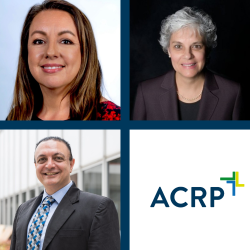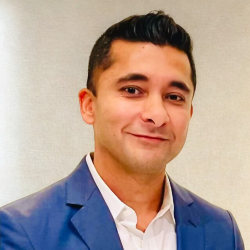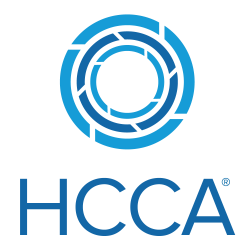As students and faculty began settling into the routines of a new academic year at universities across the U.S., ACRP reached out to experts from graduate programs in clinical research for a snapshot of how education in this field, especially at the master’s degree level, is holding up amidst rapidly evolving changes in the research enterprise itself. Presented below is the feedback we received from academicians at the University of Arizona, Rutgers, and University of Southern California who were generous with their responses at this busy time of year for their programs.
Helping to keep us up to date on trends among clinical research graduate students are:
 Melisa Celaya, MA, PhD, Assistant Research Professor, Director of Research Education, GME Research Education and Administration Director, and Clinical Research MS Graduate Program Director for the University of Arizona College of Medicine, Phoenix.
Melisa Celaya, MA, PhD, Assistant Research Professor, Director of Research Education, GME Research Education and Administration Director, and Clinical Research MS Graduate Program Director for the University of Arizona College of Medicine, Phoenix.
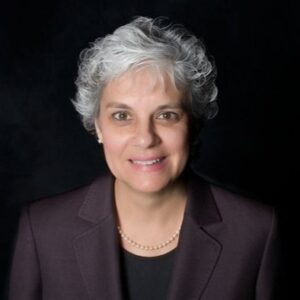 ACRP member Doreen Waldron Lechner, PhD, Program Director and Assistant Professor for the MS in Clinical Research Management Program in the School of Health Professions at Rutgers, The State University of New Jersey.
ACRP member Doreen Waldron Lechner, PhD, Program Director and Assistant Professor for the MS in Clinical Research Management Program in the School of Health Professions at Rutgers, The State University of New Jersey.
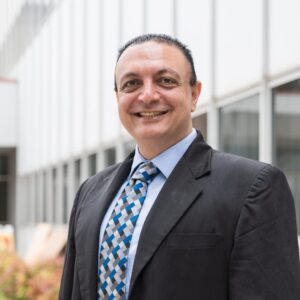 ACRP member Tony Succar, PhD, MScMed, Assistant Professor in the Mann School of Pharmacy and Pharmaceutical Science, Department of Regulatory and Quality Sciences, University of Southern California (USC). New for the 2024–2025 academic year, USC offers an MS in Clinical Trial Management which is coordinated through Succar’s department.
ACRP member Tony Succar, PhD, MScMed, Assistant Professor in the Mann School of Pharmacy and Pharmaceutical Science, Department of Regulatory and Quality Sciences, University of Southern California (USC). New for the 2024–2025 academic year, USC offers an MS in Clinical Trial Management which is coordinated through Succar’s department.
ACRP: How well prepared are incoming students in clinical research master’s degree programs for their studies in the face of ongoing, rapid advances in the profession?
Celaya: Many students are coming to our clinical research programs with diverse backgrounds and preparedness. Some are recent undergraduates and others mid-career professionals or clinicians. Even though these students come to us with strong scientific backgrounds, many of them need a deeper understanding of regulatory fundamentals, data management skills, and the knowledge of ethical considerations when designing clinical research projects. We are starting to integrate clinical research coursework in each level of student and trainee engagement to better position students for success in their graduate studies.
Lechner: The incoming students to our master-level clinical research degree are from many different backgrounds and come from varying levels of preparedness. However, our master program has rigorous entry requirements including written and oral communications, which allow the best students to be brought into our program, ready to hit the ground running with their studies. Most of the students adapt rapidly after completing the foundational courses.
Succar: The exciting world of clinical trials and research has seen tremendous advances in the profession, and while our incoming students often have strong medical, health, science, and clinical backgrounds, many are underprepared in terms of specific competencies, skills, and knowledge needed to conduct and manage modern clinical trials and research teams.
Many incoming students in our programs come from varied professional backgrounds, including physicians, pharmaceutical industry employees, and PhD and postdoctoral students. This diversity suggests varying levels of prior research experience and knowledge. To address gaps in preparation, we have developed more accessible curricula integrating Good Clinical Practice, research processes, and regulatory requirements.
Furthermore, the rapid advances mean even experienced professionals may need additional training since clinical researchers need to be competent in areas such as following complex regulatory requirements; ensuring compliance, ethical study conduct, and participant safety; communicating effectively with research participants; leading diverse research teams; and understanding study design, statistics, and data management. [These competencies are covered in more detail in a forthcoming article coauthored by Succar for ACRP’s Clinical Researcher journal.]
The responsibilities and skills required of clinical research professionals have expanded over time. Many students interested in becoming clinical researchers struggle to find formalized training that prepares them to conduct safe, well-designed clinical research. Thus, our programs continue to evolve and adapt to provide more accessible options to help students gain these competencies. Ongoing evaluation and curriculum development are conducted to ensure our programs adequately prepare incoming students for the evolving demands of clinical research careers.
ACRP: Are the kinds of undergraduate programs the younger students are coming from giving them a good leg up on tackling graduate studies in the field?
Celaya: Traditional students coming from undergraduate training in health sciences or clinical disciplines often have a solid foundation. But since clinical research is a field that is constantly changing, these students still need a foundation that their traditional science backgrounds don’t necessarily give them in a scholastic setting.
Succar: Unfortunately, there is limited education and training specific to clinical trials and research in undergraduate programs. We have a diverse cohort of incoming students with a range of experiences from years of extensive clinical research experience to no experience at all. Thus, we offer programs designed to help undergraduates prepare for graduate school, providing research experience and mentorship to undergraduates. For students coming from non-science backgrounds, we also offer science enrichment courses to help them prepare for our programs.
On the flip side, students coming directly from undergraduate programs may have some advantages, as they are likely more accustomed to the academic environment and study habits required for graduate work. Recent exposure to foundational coursework may be fresher in their minds. They may have more flexibility and fewer outside commitments compared to older students who are balancing work and family responsibilities.
Ultimately, success in graduate studies depends on individual preparation, motivation, and the specific skills and experiences gained during undergraduate education, regardless of age. Both younger and older students can excel in graduate programs if they have adequately prepared themselves and chosen a program that aligns with their goals and background.
ACRP: Are the older students coming in for advanced studies as ways to change careers or climb their existing clinical research career ladder able to prepare themselves well for graduate studies based on resources from the graduate programs or elsewhere?
Celaya: Non-traditional students, many of whom come from established careers in healthcare or related fields, bring practical experience to the table, often in areas like nursing, clinical areas, data management, or regulatory affairs. Many of them come to us from entry-level clinical research jobs. Their real-world experience is invaluable, but transitioning into academic study can present a different set of challenges, particularly for those who have been out of formal education for several years. In these cases, we’ve found that graduate programs need to offer additional support, such as modules or refreshers on academic writing, research methodologies, and current industry standards. Many programs, including ours, have started providing resources like boot camps or online primers to help these students bridge any knowledge gaps and ease back into academic life.
Lechner: The master programs built for today’s working students are rigorous and allow application of what they have learned in their career and the classroom. Their professional experience allows them to build on their solid foundation, and our program fine tunes the gaps as they continue in their course journey.
Succar: Adult learners often have different needs compared to traditional students coming directly from undergraduate studies, and the Master of Science in Clinical Trial Management is perfect for those learners seeking a career change or promotions within their existing clinical research careers and institutes.
In addition, our institution offers career planning and development resources and courses specifically designed for older graduate and postdoctoral trainees in clinical research. These courses increase career readiness and awareness of career options for graduate and older students, which helps to expand their awareness of careers that align with their advanced skill sets.
Many older students are employees with families who study as part-time rather than full-time students, so taking advantage of these career planning courses and resources offered is beneficial for them. We also offer mentoring opportunities, as mentoring relationships can be valuable for career development, as well as flexible scheduling and delivery options to accommodate work/life balance.
Adult learners can leverage their work experience and transferable skills from previous careers and develop new career adaptability skills to navigate transitions. We accommodate the needs of adult learners and offer opportunities for both career changers and those advancing in their existing clinical research careers.
ACRP: Can these academic programs really keep up with ever-changing developments in the field these days?
Celaya: The landscape of clinical research education has rapidly evolved. Many changes have come about due to the need to keep pace with advances in technology, regulations, and research methodology. This can definitely be an issue for master’s programs that are stagnant within the same curriculum year to year when so many changes are happening in the regulatory arena, artificial intelligence, industry connection, and dissemination of scholarly activity. We take a more agile approach by examining the curriculum on an annual basis to make sure we adapt to those changes. We also have content experts as guest lecturers who are currently working and developing clinical research projects in real time. This allows our students to hear from faculty who know about current trends and include any anticipated changes. We also partner with our university clinical research office to ensure we are giving the most current information. A close relationship between academia and industry is essential for ensuring that graduates are well-equipped to thrive in this dynamic field.
Lechner: Academic programs such as ours have advisory boards, core faculty, and adjunct faculty who are deeply rooted in clinical research management and who collaborate to assure our program is current with today’s environment. Our program allows faculty time to update their course content on an evolving basis to keep current with the ever-changing developments in clinical research as well as to include recent case studies. In addition to the more basic courses which lay out the foundation of the regulations and guidance, the program includes coursework to allow “hot topics” in the clinical research enterprise to be presented to the students.
Succar: The dynamic nature of clinical trials and research means that formal education and continuous learning are necessary for professionals to remain up to date with the ever-changing developments in the field. Our department embraces these innovative changes and has established strong collaborations and relationships with pharmaceutical, biotech, and academic institutions to provide students with opportunities to pursue current clinical research projects and remain abreast of ongoing developments.
Some of our adaptations include bringing in industry experts as guest lecturers or adjunct faculty; offering internships and co-op programs for real-world experience; and developing joint research initiatives on cutting-edge topics. These partnerships help our programs to stay more closely aligned with industry needs.
We frequently update our curricula to incorporate emerging technologies and industry trends, by adding new courses on topics like artificial intelligence, machine learning, and data science; integrating project-based learning to give students hands-on experience with current tools and practices; and offering specialized tracks or concentrations in high-demand areas.
I believe that a combination of formal education and continuous self-directed learning is necessary to truly keep pace with industry developments.
Edited by Gary Cramer
